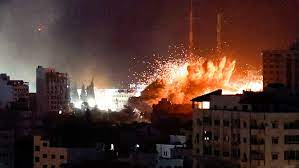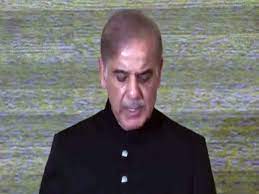No matter who loses in the Israel-Hamas conflict, Iran triumphs
In the conflict that has erupted between Israel and the Palestinian terrorist organization Hamas, there can be only one victor. And neither Hamas nor Israel are involved.
On October 7, 2023, Hamas, formerly known as the Islamic Resistance Movement, launched hundreds of missiles into Israel in an operation known as “the Al-Aqsa Storm.” Fighters from Hamas and the Palestinian Islamic Jihad snuck into Israel through land, sea, and air. More than 2,000 Israelis have been hurt, hundreds of them fatally, and many more have been held prisoner.
Benjamin Netanyahu, the Israeli prime minister, retaliated by declaring war on Hamas and conducting airstrikes in Gaza. According to the Palestinian Health Ministry, about 400 Palestinians were murdered on the first day of retaliation.
The Israeli military will undoubtedly strike again in the coming weeks, killing hundreds more Palestinian terrorists and civilians. I think that thousands will suffer on both sides as a security and political expert for the Middle East. But after all is said and done, only one nation’s interests will have been advanced: Iran’s.
Some observers have already said that Tehran’s influence may be detected in the unexpected assault on Israel. Iran’s authorities have, at the absolute least, encouraged and supported the attack.
The 1979 ouster of the oppressive, US-friendly Shah of Iran and the subsequent transfer of state power to a Shiite Muslim revolutionary administration changed Iran’s foreign policy decisively. Strong anti-American imperialism and anti-Israeli Zionism characterized its rule.
The revolution, according to its leaders, was not simply meant to overthrow the corrupt Iranian monarchy; it was also meant to combat tyranny and injustice worldwide, particularly under American-aligned nations, Israel being foremost among them.
Israel and the United States were seen by Iran’s authorities as the biggest danger to Iranian security and Muslim society, as well as immorality and injustice. Due in large part to Israel’s strong relations to the shah and its participation in his ongoing persecution of the Iranian people, there is still a great deal of animosity against that country.
Israel’s Mossad intelligence agency, together with the U.S. Central Intelligence Agency, assisted in setting up the SAVAK, the shah’s secret police and intelligence agency.
During the latter two decades of the shah’s rule, this organization used increasingly extreme methods to suppress opposition, including widespread incarceration, torture, disappearances, forced exile, and the murder of thousands of Iranians.
Israel is being attacked in a shocking Hamas action.
Iran’s revolutionary discourse placed a strong emphasis on its support for the liberation of Palestine. Iran had the chance to live up to its anti-Zionist rhetoric by confronting Israeli forces in Lebanon and limiting U.S. influence in the area during the 1982 Israeli invasion of Lebanon, which was in retribution for Palestinian assaults against Israel from Lebanon.
supporting hostilities
In order to organize and assist Lebanese and Palestinian militants, Iran sent its Islamic Revolutionary Guard Corps, a division of the military often referred to as the “Revolutionary Guard,” to Lebanon. Shiite resistance fighters were taught religion, revolutionary theory, and guerilla tactics by Revolutionary Guardsmen in Lebanon’s Bekaa Valley. They were also given weapons, money, training, and support.
The leadership of Iran turned these early recruits from a loose group of warriors into Hezbollah, Iran’s biggest international achievement, which is now Lebanon’s most potent political and military force.
Iran has continued to sponsor anti-Israeli terrorist organizations and actions since the early 1980s. In addition to providing extensive military training for thousands of Palestinian militants in Revolutionary Guard and Hezbollah sites in Iran and Lebanon, the Islamic Republic has officially promised to provide millions of cash each year to various organizations.
Gaza, which has been isolated from the outside world for a long time due to an Israeli embargo, is supplied with weaponry by Iran via a sophisticated smuggling network.
Iran has supported and enabled Palestinian Islamic Jihad and Hamas violence through the Revolutionary Guard and Hezbollah, and these Palestinian fighters now play a key role in what foreign policy analysts refer to as Iran’s “Axis of Resistance” against Israel and the United States, which is Iran’s primary goal.
Iran, however, cannot take a chance and go up against any nation.
When anger erupts, such as during the Palestinian uprisings known as the first and second intifadas, Iranian weaponry, money, and training allow spikes in militant action by Palestinians against Israel.
Since 2020, Israeli-Palestinian violence and death tolls have gradually increased. Increased forced evictions, property damage, and Israel’s allowing Israeli nationalists and settlers to disobey a long-standing agreement prohibiting Jewish prayer at the Al-Aqsa Mosque, a place revered by both Muslims and Jews, have infuriated Palestinians.
In reality, Hamas expressly highlighted a recent invasion by settlers into Al-Aqsa as motivation for the assault on October 7.
opposition to normalization
The Palestinian terrorists are not Iranian puppets, thus this does not imply that Iran directed Hamas to attack Israel or that Iran oversees them. The timing of the strikes, which fortunately favors Iran and helps it in its struggle for dominance in the region, was welcomed by Iran’s authorities nevertheless.
According to Nasser Kanani, a spokesman for the Iranian foreign ministry, “what happened today is in line with the continuation of victories for the anti-Zionist resistance in different fields, including Syria, Lebanon, and occupied lands.”
Saudi Crown Prince Mohammed bin Salman refuted claims that recent attempts to improve ties with Israel, which include a formal acknowledgment of Israel’s right to exist and increasing diplomatic engagement, had been put on hold the week before the Hamas assault. He said, “Every day we get closer,” a statement Netanyahu commended and agreed with.
The culmination of U.S. diplomatic efforts to date, including the Abraham Accords, which Israel, the United Arab Emirates, Bahrain, and Morocco will sign in 2020, would be Israeli-Saudi normalization. The agreements sought to normalize and foster goodwill between Israel and Arab nations in the Middle East and Africa.
By approving the Abraham Accords, Arab nations, according to Iran’s supreme leader Ali Khamenei, have committed “treason against the global Islamic community.”
Hassan Nasrallah, the head of Hezbollah, applauded Saturday’s aggression against Israel and reiterated Khamenei’s views, admonishing those who sought normalization with this adversary that the strikes send a message.
In the near future, Saudi Arabia’s rapprochement with Israel is likely to be complicated, serving Iran’s objectives by Israel’s anticipated harsh reaction. According to Netanyahu, Israel’s retaliatory operation has three goals: to end the threat of infiltrators, restore calm to communities that have been attacked by Israeli armed forces, and simultaneously “exact an immense price from the enemy” in Gaza. Finally, Netanyahu said that the operation will strengthen “other fronts so that nobody should mistakenly join this war.”
This last goal is a subtly stated but loud warning to Iran and Hezbollah to remain out of the conflict.
In order to protect its borders, Israel has already mobilized soldiers, and airstrikes have already targeted Gaza. Palestinian assailants will most likely be put to death or taken into custody within a few days.
Along with known or suspected missile production, storage, and transportation facilities, Israeli forces will also target the residences of Hamas and Palestinian Islamic Jihad militants. However, hundreds of civilians will probably also perish in the process.
I think Iran welcomes and anticipates all of this.
How Iran triumphs
The conflict might have at least three different outcomes, all of which are favorable to Iran.
First, Israel’s harsh retaliation would discourage Saudi Arabia and other Arab nations from supporting American-backed Israeli normalization efforts. Second, if Israel decides to advance farther into Gaza in order to eliminate the danger, this might spark a new uprising by Palestinians in East Jerusalem or the West Bank, which would prompt a more extensive Israeli reaction and further instability.
Finally, Israel may avoid using the typical heavy-handed tactics and lower the likelihood of an escalation by use the least amount of force required to accomplish its first two goals. However, it is doubtful. And even if it did, the fundamental reasons for this most recent outbreak of violence have not been addressed, nor has Iran’s facilitation of it.
And I think Iran’s officials will once again congratulate themselves for a job well done when the next wave of Israeli-Palestinian bloodshed arises, which it will.







